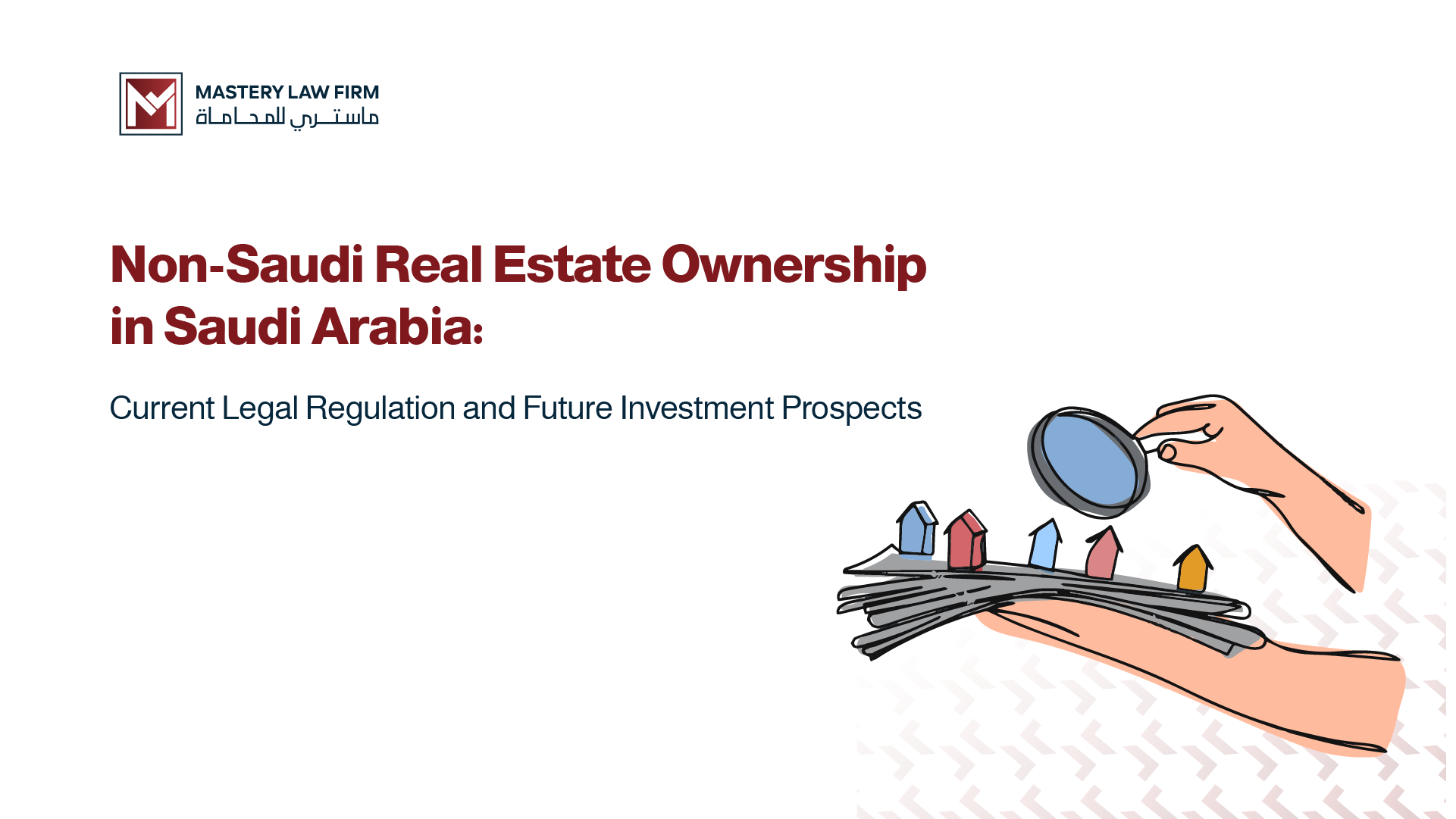In light of the economic and social transformations taking place in the Kingdom of Saudi Arabia, the issue of “non-Saudis owning real estate in Saudi Arabia” emerges as one of the legal issues of a strategic nature. The importance of this issue increases given its close connection to attracting foreign investments and developing the real estate market, while at the same time maintaining sovereign and regulatory considerations.
With the acceleration of national plans to achieve the goals of the Kingdom’s Vision 2030, it has become necessary to study the regulatory framework for non-Saudis to own real estate, and to determine the features of the next stage in light of government decisions and official statements.
The current regulatory context in the Kingdom
As of the date of writing this article, there is no applicable legal system that allows non-Saudi individuals to absolutely own real estate throughout the Kingdom. Indeed, the existing regulation imposes restrictions on real estate ownership by non-Saudis, and in some cases is limited to foreign investors through official investment channels and under licenses issued by the Ministry of Investment and the Real Estate Authority.
Non-Saudis are also explicitly prohibited from owning real estate within the Makkah and Madinah regions, except in specific cases related to heirs or endowments, based on the system of non-Saudis owning real estate in these two regions.
It is worth noting that the new investment system for the year 1446 AH allows foreign investors to own assets, including real estate, provided that regulatory requirements are met and the necessary approvals are obtained.
Cabinet Resolution No. (94) of 1444 AH
In a remarkable step, the Council of Ministers issued Resolution No. (94) dated 1/24/1444 AH regarding studying the regulation of non-Saudis’ ownership of real estate in the Kingdom. However, the General Real Estate Authority explained in an official statement that the decision is still under study by the competent authorities, and no executive regulations have been issued regarding it so far.
This means that the decision has not entered into force and cannot be actually implemented before the issuance of the executive regulations that define the scope of ownership, the permitted categories, and the controls related to the geographical area and type of property. Therefore, the current legal situation does not allow foreigners to own real estate except within the framework of what is stipulated in the applicable and limited-scope regulations.
The difference between a decision and an executive regulation in the Saudi system
Cabinet Resolution No. (94) regarding non-Saudis owning real estate is a first legislative step, but it is not a directly applicable text. According to the Saudi system, the executive regulations serve as the regulatory tool that clarifies the details of implementing the decision, and specifies the procedural and technical provisions necessary to ensure that the content of the decision is implemented accurately and clearly.
Therefore, the failure to issue the executive regulations results in the decision remaining within its theoretical framework, without having a direct legal impact on the rights or obligations of individuals or relevant parties.
The current legal status of foreign ownership of real estate
Currently, the rules governing “non-Saudis owning real estate in Saudi Arabia” are still based on partial regulations, which permit ownership only in specific investment cases and within specific regions.
For example, a foreign investor who obtains a license from the Ministry of Investment may own real estate designated for the purposes of the investment project, provided that it is not in prohibited areas, such as the Two Holy Mosques. Licensed foreign companies may also engage in real estate activity, but within restrictions related to the type of property, its location, and the purpose of ownership.
Data issued by the Real Estate Authority indicate that the majority of foreign applications for ownership fall within industrial and commercial projects and not for residential purposes, which reflects the Kingdom’s trend towards restricting residential ownership for non-Saudis at the current stage.
Saudi regulations related to property regulation
:The issue of “non-Saudis owning real estate in Saudi Arabia” is linked to a number of basic regulations, the most prominent of which are
- Saudi Investment Law (1446 AH): It allows foreign investors to own real estate related to the purposes of investment activity, accordance with certain requirements determined by the competent ministry.
- Non-Saudi property ownership system in Mecca and Medina: Ownership is completely prohibited in these two regions, with some specific exceptions.
- Real estate registration system: It regulates the proof and documentation of real estate ownership, and in some cases requires verification of the owner’s eligibility and nationality.
- Municipal real estate system: imposes additional restrictions on ownership of land owned by government agencies or subject to private urban regulation.
- Anti-money laundering system: imposes obligations on real estate entities to verify the source of funds for foreigners wishing to purchase real estate.
Note: Regulations related to non-Saudis’ ownership of real estate are still subject to oversight and coordination between several regulatory bodies, most notably: the Ministry of Investment, the Real Estate Authority, the Ministry of Municipal and Rural Affairs and Housing, and the Zakat, Tax and Customs Authority.
Ownership in economic cities and major projects
Economic cities and special areas, such as King Abdullah Economic City, NEOM, and the Red Sea, are among the most prominent locations where non-Saudis have been allowed to have varying degrees of ownership of real estate, whether through long-term rent or conditional ownership within special regulatory frameworks.
These projects have granted expanded powers to their administrative bodies to regulate and supervise ownership, achieving a balance between attracting foreign investments and preserving real estate sovereignty.
Real estate ownership in these areas is expected to constitute a regulatory model upon which to expand opportunities for non-Saudis to own real estate in Saudi Arabia in the future, especially in light of the Kingdom’s vision that focuses on developing qualitative economic zones of a global nature.
Challenges and concerns associated with foreign property ownership
Despite the great investment potential offered by opening the real estate market to foreigners, there are a number of challenges and concerns that must be taken into account, the most prominent of which are:
- National Real Estate Security: Fear of the concentration of strategic properties in the hands of non-Saudi entities in areas of special economic or geographical importance.
- Pressure on real estate prices: The possibility of rising housing and land prices as a result of increased external demand, which may negatively affect citizens’ ownership opportunities.
- Money laundering issues: The risks of using the real estate market as a means of money laundering in the absence of effective oversight mechanisms over sources of purchase financing.
- Violation of urban identity: The entry of foreign investors who do not comply with municipal and urban controls may lead to a change in the pattern of urban development or a lack of compliance with local requirements.
Expected opportunities for opening the real estate market to foreigners
On the other hand, there are many economic and investment opportunities that can be achieved by regulating non-Saudis’ ownership of real estate in Saudi Arabia, the most prominent of which are:
- Attracting foreign direct capital, which contributes to stimulating the construction and urban development movement.
- Raising the level of real estate supply by encouraging international development companies to enter the Saudi market.
- Enhancing the Kingdom’s regional competitiveness in attracting investors compared to countries such as the UAE and Qatar.
- Stimulating real estate-related sectors such as finance, contracting, and logistics, thus enhancing GDP.
- Diversifying non-oil sources of income, which is one of the main targets of Vision 2030.
Proposed controls to achieve legal balance
In the event that the executive regulations of Cabinet Resolution No. (94) are issued, it is necessary to include legal controls that maintain the balance between attracting investment and protecting the public interest. The most prominent of these proposed controls are:
- Determine the geographical areas permitted for foreign ownership, excluding border and sacred areas.
- Setting an upper limit on the area or number of properties that may be owned by each foreign investor.
- Requiring a real investment purpose for ownership, especially in the case of companies or commercial entities.
- Verify solvency and source of funds to ensure transparency and prevent manipulation.
- Limiting ownership to individuals or entities that have regular residency or approved commercial licenses.
The role of regulatory authorities in ensuring the safety of the application
Implementing the “non-Saudis own real estate in Saudi Arabia” policy requires careful and integrated supervision from multiple regulatory bodies, including:
- The Real Estate Authority, as the body responsible for setting real estate policies and regulating the market.
- The Ministry of Investment, which is responsible for licensing foreign investors and monitoring their compliance with the conditions.
- Ministry of Municipal and Rural Affairs and Housing, concerned with urban planning and supervision of real estate development.
- The General Authority of Zakat, Tax and Customs, to verify investors’ financial obligations.
- The Monetary Agency and the Capital Market Authority, to ensure that real estate is not used for illegal activities such as money laundering or tax evasion.
It is expected that, once the executive regulations are issued, these authorities will prepare unified electronic platforms that facilitate procedures and increase transparency, while ensuring that all contracts are documented through approved judicial authorities.
The issue of non-Saudis owning real estate in Saudi Arabia is still in the legal process, and reflects the Kingdom’s move towards creating an attractive and balanced investment environment. Despite the issuance of Cabinet Resolution No. (94) regarding studying the regulation of this ownership, the absence of executive regulations so far means that the regulatory rules have not been finally determined, which requires caution on the part of investors and vigilance on the part of regulatory authorities.
This file is one of the topics that requires legislative and institutional integration, so that economic goals are achieved without compromising social stability and national real estate identity.



